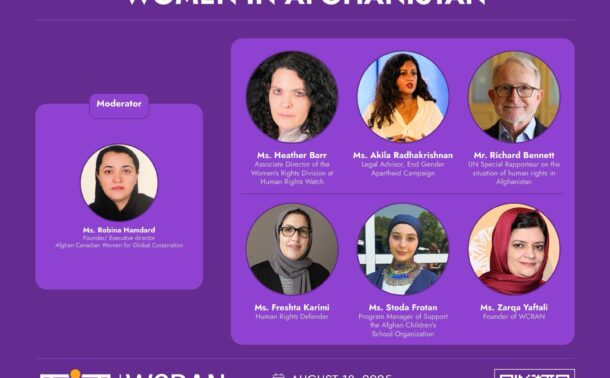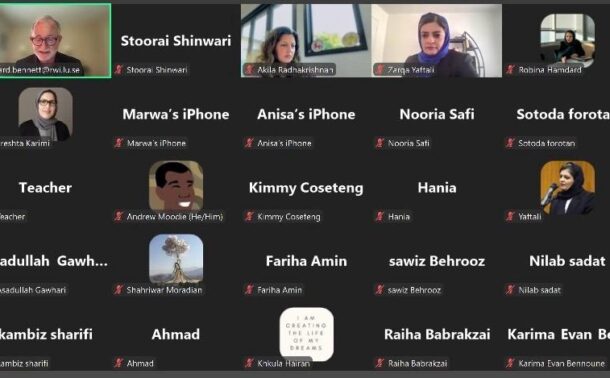Four Years of Darkness and Systematic Discrimination Against Women in Afghanistan
Four Years of Darkness and Systematic Discrimination Against Women in Afghanistan
Women and Children Research and Advocacy Network – WCRAN held a webinar titled “Four Years of Darkness and Systematic Discrimination Against Women in Afghanistan” on August 18th, to mark the fourth anniversary of the fall of the republic regime in Afghanistan and the ongoing denial of women’s fundamental rights,. The event aimed to assess the current situation of women and explore reasons behind the limited effectiveness of international efforts to improve their conditions.
 The online session featured the UN Special Rapporteur on the Human Rights Situation in Afghanistan, civil society representatives, human rights activists, and women’s rights defenders from within and outside Afghanistan, moderated by Rabina Hamdard. A summary of the WCRAN’s latest research, titled “The Impact of Taliban Edicts on Women and Girls in Afghanistan,” was presented, examining the overall effects of Taliban restrictions on women’s rights, especially education, employment, and social and political participation.
The online session featured the UN Special Rapporteur on the Human Rights Situation in Afghanistan, civil society representatives, human rights activists, and women’s rights defenders from within and outside Afghanistan, moderated by Rabina Hamdard. A summary of the WCRAN’s latest research, titled “The Impact of Taliban Edicts on Women and Girls in Afghanistan,” was presented, examining the overall effects of Taliban restrictions on women’s rights, especially education, employment, and social and political participation.
The event commenced with a speech by Zarqa Yeftali, the CEO of WCRAN who highlighted increasing Taliban restrictions and decrees against women. She emphasized that the research analysed the impact of 155 Taliban decrees on women’s lives to inform advocacy efforts, noting that many social issues faced by women and girls remain unreported due to limited media access, calling for amplified voices from Afghanistan women.
Key findings from the research, presented by Marwa Nabizada “WCRAN Member”, included:
- 7% of respondents experienced gender-based violence (GBV), with 56.4% witnessing such violence.
- 1% reported that at least one family member was deprived of education; 5.9% said no girls of schooling age existed in their families.
- 5% supported girls’ education.
- 6% lack access to employment, with only 8.4% having job opportunities.
- 2% indicated women are prohibited from unaccompanied travel and using public transportation.
- 4% identified economic hardship due to job loss as a critical consequence.
Then, Mr. Richard Bennett, UN Special Rapporteur on the situation of human rights in Afghanistan, discussed on “how to stop Afghanistan becoming a lost cause – the “all tools” approach” condemning Taliban abuses such as arbitrary arrests, torture, enforced disappearances, and restrictions on civil society, asserting that the situation of Afghanistan is a test for the global community’s commitment to human rights and gender equality.
 Thereafter, Ms. Heather Barr, Associate Director of the Women’s Rights Division at Human Rights Watch, talked on “Mobilizing to Make Gender Apartheid a Crime Against Humanity” and emphasized recognizing “gender apartheid” as a crime against humanity, describing Afghanistan’s crisis as “the most severe humanitarian rights crisis globally” with far-reaching implications for women’s rights worldwide. She praised Afghanistan women’s advocacy efforts despite challenges and called for global attention to Afghanistan’s plight.
Thereafter, Ms. Heather Barr, Associate Director of the Women’s Rights Division at Human Rights Watch, talked on “Mobilizing to Make Gender Apartheid a Crime Against Humanity” and emphasized recognizing “gender apartheid” as a crime against humanity, describing Afghanistan’s crisis as “the most severe humanitarian rights crisis globally” with far-reaching implications for women’s rights worldwide. She praised Afghanistan women’s advocacy efforts despite challenges and called for global attention to Afghanistan’s plight.
Next, Ms. Akila Radhakrishnan, Legal Advisor, End Gender Apartheid Campaign, stated that “gender apartheid is not just an abstract legal concept but reflects Taliban governance,” urging that prioritizing women’s rights and combating gender-based violence should be prerequisites for engaging with the Taliban.
After that, Ms. Frishta Karimi, a human rights defender, addressed challenges women face in accessing justice, noting the collapse of the Afghanistan judicial system and the dominance of male elders, often Taliban officials, in resolving cases—effectively impunity for perpetrators of violence and rights violations. She underscored that supporting Afghanistan women and girls is a shared global responsibility, not charity.
At the end of the webinar, most participants and speakers had the chance to discuss and concluded by emphasizing the urgent need to recognize “gender apartheid” as a crime against humanity to prevent the systemic discrimination and oppression of Afghanistan women and girls from being overlooked. They also emphasized the importance of supporting educational opportunities and strengthening women-led institutions that are at the forefront of defending women’s rights and providing vital services.


